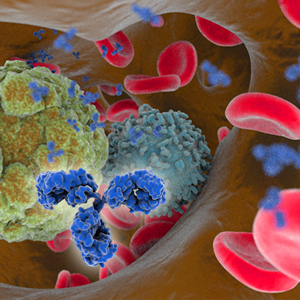 Please join us at the Society’s annual meeting, Antibody Engineering & Therapeutics, on December 11-15, 2017 at the Manchester Grand Hyatt, San Diego, CA! In this summary, chairperson James Larrick, M.D., Ph.D., Managing Director and Chief Medical Officer, Panorama Research Institute and Velocity Pharmaceutical Development, discusses what you will learn at his session on novel therapeutic indications for antibodies, which will be held on Thursday December 14, 2017.
Please join us at the Society’s annual meeting, Antibody Engineering & Therapeutics, on December 11-15, 2017 at the Manchester Grand Hyatt, San Diego, CA! In this summary, chairperson James Larrick, M.D., Ph.D., Managing Director and Chief Medical Officer, Panorama Research Institute and Velocity Pharmaceutical Development, discusses what you will learn at his session on novel therapeutic indications for antibodies, which will be held on Thursday December 14, 2017.
Intense efforts are underway in both academic and industrial labs to identify novel therapeutic targets using antibody technology. Much progress has been made, with many therapeutic antibodies populating the preclinical pipeline. Promising therapeutic antibody targets will be presented in this session. First, John Cambier (University of Colorado Medical Center) will describe therapeutic antibodies that silence B cells by emulating peripheral immune tolerance. Targeting CD20 by rituximab and similar cell-targeted therapies whose effects are mediated by B cell depletion has proven efficacious in a variety of autoimmune settings, but this approach has substantial risks due to long-term compromise of adaptive immunity. Dr. Cambier’s lab has pioneered an alternative, non-B cell depleting approach, which employs emasculated antibodies directed against antigen receptor components to induce a reversible state of anergy. This approach has proven effective in treatment of mouse models of type 1 diabetes, lupus and rheumatoid arthritis.
Uncontrolled fibrosis contributes to the pathogenesis of disease affecting many tissues, among these congestive heart failure, chronic kidney disease and cirrhosis. Idiopathic pulmonary fibrosis (IPF) is a chronic fatal lung disease with rapid, progressive loss of pulmonary function. TGF-β can induce fibroblast differentiation and is fundamental to the pathogenesis of pulmonary fibrosis. Protein tyrosine phosphatase α (PTP-α) has been shown to be a key regulator of the TGF-β-mediated fibrotic process in animal models of IPF. Bo Yu (Larix Bioscience) will describe development of an inhibitory PTPα antibody for fibrotic diseases.
Despite aggressive LDL cholesterol reduction, substantial residual risk of coronary heart disease remains. APOC3 is a highly genetically validated therapeutic target for hypertriglyceridemia and cardiovascular disease. Daniel Rader (Perelman School of Medicine, University of Pennsylvania) will describe a series of anti-APOC3 monoclonal antibodies that markedly reduce triglycerides in a humanized mouse model. Targeting APOC3 with an antibody may be the next-generation therapy to reduce triglycerides and risk of coronary artery disease.
Another approach to reverse acute type 1 diabetes (T1D) with an anti-TLR4/MD-2 monoclonal antibody will be described by William Ridgway (University of Cincinnati College of Medicine). New onset T1D (hyperglycemia, polyuria and weight loss) in nonobese diabetic (NOD) mice was attenuated by treatment with antagonistic TLR4/MD-2 specific monoclonal antibody (“TLR4-Ab”). 90% of NOD mice treated with TLR4-Ab showed a clinical response (delay in progression to end stage T1D), and 70% have permanent reversal of T1D. Successfully treated mice demonstrate decreased islet inflammation and preserved insulin staining of islet beta cells. Although TLR4-Ab does not stimulate T cells directly, immune tolerance can be restored to the adaptive immune system by this treatment. The TLR4/MD-2 pathway is a promising new therapeutic approach for treating autoimmunity.
FGF21 analogs belong to an emerging class of therapeutic candidates for type 2 diabetes and fatty liver disease. An engineered bispecific anti-FGFR1/β-Klotho agonist antibody that acts as a long-acting FGF21-mimetic will be described by Junichiro Sonoda (Genentech, Inc.). In addition, the mechanism of antibody action, together with the results from the first-in-human study performed with obese human subjects will be presented.
Preclinical studies showed the feasibility of targeting mural cell survival by using modulating antibodies capable of activating Notch 3 signaling. Joseph F. Arboleda-Velasquez (Harvard Medical School, Massachusetts Eye and Ear) will discuss implications of this work for prevalent causes of mural cell degeneration, including diabetic retinopathy and cerebral small vessel disease.
Interested in attending the meeting? Society members can save 15% on the registration fee!
Not a member? Please join!
Membership is free for students and employees of the Society’s corporate sponsors.

